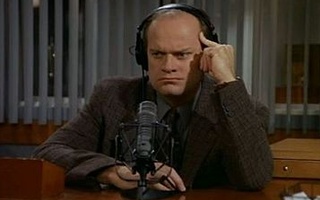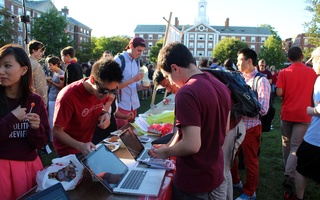Harvard students are increasingly studying economics, hard sciences, and computer science, leaving the humanities to suffer a widely lamented drop in popularity. Over half of the freshmen originally planning to pursue art and the humanities ultimately choose a different route, leaving under 17 percent of students concentrating in the humanities. It seems as though something they encounter during their years at Harvard—perhaps self-selection toward concentrations with greater employment opportunities, or the very culture of the University—alters their thinking.
In messages to students, the administration touts monetary gains and quantifiable scientific research as its key measures of success. In President Drew G. Faust’s end-of-the-year email in June, the only message last year’s freshmen received offering Faust’s thoughts on student life, Faust focuses on finances and scientific research results.
Art, social sciences, and the humanities are only briefly mentioned in the conclusion, and no contributions to these areas, whether research or otherwise, are mentioned. This sends to students the implicit message that the administration values these pursuits less.
The administration’s value judgments are also evident in its hesitation to provide the Undergraduate Council with $250,000 in additional funds to support student groups, club sports, the Harvard-Radcliffe Dramatic Club, and the Phillips Brooks House Association. UC President Gus A. Mayopoulos has pointed out that while the UC’s budget is $500,000, other colleges’ student governments control multi-million dollar budgets, and that these funding increases could dramatically enhance student life. The administration can certainly afford to spend $250,000 on extracurricular endeavors, since it allocates over $7 million annually to undergraduate students pursuing research outside the classroom. Their refusal is therefore a reflection of the administration’s view that extracurricular activities are of secondary importance.
While research is arguably generally an extension of the classroom, for some academic areas, extracurricular activities serve as their more natural expansion. For students of drama, for instance, theater productions are most relevant to their study. Literature students, on the other hand, might focus on student publications and writing competitions. Therefore, when the administration allocates its resources, it should give areas outside research due priority.
The current neglect of other fields departs from Harvard’s liberal arts objectives. The General Education requirements highlight “art, ideas, and values” as key aspects of students’ lives. And the school advertises itself as a “transformative experience” where students pursue their interests in any field to their fullest possible extent. When the administration prioritizes certain interests, it does not fulfill these objectives.
An overemphasis on scientific research harms the school’s culture. Extracurricular activities, arts, the humanities, and other related fields offer more than a diversity of opportunity on Harvard’s campus. They provide a wealth of new ideas and ways of thinking that make the community interesting and vibrant.
The remedy to this negative focus has several components. First, the administration should actively acknowledge research accomplishments in an array of fields, including the social sciences and the humanities. Second, it should recognize and encourage great moments in literature, art, and public service outside the realm of research. For instance, emails could reflect on published creative and artistic pieces, and discuss strides in public service and policy awareness made on campus.
Finally, while securing funds to further research opportunities and financial aid is critical, and the school is rightfully grateful to the donors who so generously give to the university, fundraising efforts should not define us.
We are more than our endowment. We are our culture of intellectual curiosity, our pursuit of ideas to the fullest, our belief that we can accomplish anything, and our dedication to pursuing our dreams. It is important that the administration recognizes that this, more than anything else, is what makes our school flourish.
Edyt J. Dickstein ’17 is a Crimson editorial writer in Adams House.
Read more in Opinion
Independence for ScotlandRecommended Articles
-
Not Just SchoolworkAs Commencement approaches, my roommate and I have spent a lot of time discussing how Harvard student life has changed ...
-
City Council Discusses Cambridge's Extracurricular Activity OfferingsPointing out that the days of playing pick-up baseball after school are long gone, officials from the Cambridge City Council and the Cambridge Schools Committee discussed ways to enrich Cantabrigian students’ extracurricular lives at the Council’s weekly meeting Monday night.
-
The Gravity of ExtracurricularsExtracurricular life at Harvard is certainly rich, but also intense, time demanding, and not insulated from pre-professional pressures.
-
Does Harvard Place Enough Value on Academics?Reality check: It is impossible for anyone to dictate exactly how anyone else should spend his time.
-
 Harvard's Greatest Characters, at Harvard
Harvard's Greatest Characters, at Harvard -
 The Extra-Curriculum
The Extra-Curriculum













